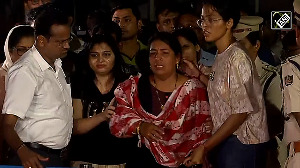SEZs (special economic zones) or no SEZs, the villages in India have all the power to keep their farmland, their houses, their forests, and their rivers.
This is all thanks to Article 243 G of the Constitution, which provides that the humble village panchayat and its planners, the rural equivalent of the Planning Commission, examine each proposal and decide if the village wants to part with its resources.
And a village panchayat in Kerala showed the way. Plachimada in the state's Palakkad district is now holy land for those who want grassroot level democracy. The 15-member Perumatty Grama Panchayat decided on April 7, 2003, not to renew the licence to Hindustan Coca Cola Beverages Ltd, an Indian arm of Coca-Cola.
The reason it gave was public interest because the company was alleged to be "causing shortage of drinking water in the area through over-exploitation of ground water sources."
The reason it could do so was the Kerala Panchayati Raj Act, 1994, derived from Article 243 G, which allows state legislatures to endow panchayats with the authority to function as an institution of self-governance.
So when the empowered group of ministers approves 83 proposals for new SEZs, it is entering a tricky zone, a zone that is not clearly in its jurisdiction.
Though a number of states do not have village or district level planning committees, their absence can hardly be an excuse for not taking their approval.
The Supreme Court ruled in a case concerning panchayat elections in 2003 that while "states cannot be permitted to withhold election of panchayats ... any legislative device of the government, which comes into direct conflict with the mandatory provisions of the Constitution (in this instance, Article 243 E) such device is ultra vires of the Constitution."
More than a decade after these laws were made, states have not carried out the constitutional mandate of devolving powers to district and village planning committees. Nobody knows exactly why.
If an SEZ is to be set up, the plan of the company will have to be acceptable under the village plan with respect to the amount of land to be allowed for farming or industry or housing. And as long as the village plan is not in place in the 600,000 villages, SEZs can hardly go ahead.







 © 2025
© 2025